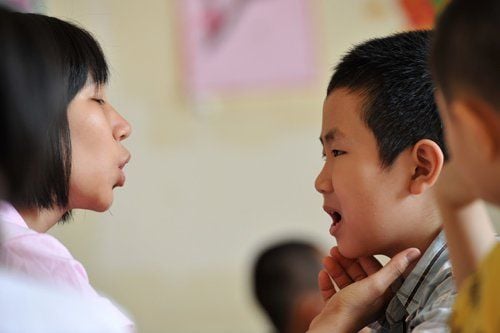This is an automatically translated article.
Speaking skills are formed early to help children succeed in developing reading, writing and communication skills throughout childhood and later in life. Therefore, in the first years of life, parents should spend time teaching children to speak.1. Signs a child has a language disorder
Children with language disorders often have the following signs:Children often do not remember the names of objects around, instead use alternative words such as "that" or "that" to express . Children often confuse related words, for example calling "the table" "chair" and calling "beef" "chicken". Unconsciously inverting words like “kitten” reads as “tear ceo”. Saying confusing sentences or putting words in the wrong order. Using wrong or saying wrong idioms, proverbs. Children always take everything literally, so they don't understand hidden statements. Children cannot concentrate when listening to other people speak, especially when there are noises such as television, music. Children are not interested in talking, even when talking to family members or close friends. Children do not remember information in the conversation that just happened. Your child doesn't seem to be listening when you or someone else is talking to him or her. Children don't care when someone reads to them. Children do not understand complex sentences. In general, if the above-mentioned symptoms are repeated on a regular basis, the child should be taken to the doctor. Children with delayed speech have poorer listening and speaking abilities than their peers. You also cannot rule out genetic causes, the level of being familiar with the language, the general development level of the children in the community, children with autism spectrum disorders, brain damage due to trauma. injury, tumor, disease.
2. Effects of language disorders on children
Language disorders affect children's ability to communicate, acquire knowledge and participate in fun activities. These disorders are usually discovered by the time the child is 4 years old. For children who have difficulty absorbing language, their ability to express themselves is also difficult. Language disorders are mainly structural language disorders, hearing disorders, normal communication abilities, but no damage to the nerves that govern speech.Some common language disorders such as speech delay, slurred speech, slurred speech, and grammatical errors. If a child is slow to speak, slurred or stammered, they will easily fall into a state of passivity, lack of confidence and poor integration. Therefore, parents need to combine teaching children to speak, correcting errors when children pronounce incorrectly, with encouraging children to integrate with people, play with friends so that children have more opportunities to communicate.
Other language disorders such as alone talking, meaningless pronunciation, slurred speech, slurred speech are the result of some developmental disability or psychological disorder. Children need to go to the doctor for early detection and timely treatment.

Rối loạn ngôn ngữ ảnh hưởng đến khả năng giao tiếp, tiếp thu kiến thức và tham gia các hoạt động vui chơi của trẻ
3. Some methods of teaching children to speak
Each child's speaking speed is different. Some babies can say a few words at 12 months, but others don't talk until they are 18 months old.3.1 Babies 1 to 3 months old Babies already love hearing your voice and may laugh, be quiet, or get excited and wave when you talk or sing to them. Baby talk usually begins with a coo with a vowel sound, like "ooh", appearing around the 2nd month.
This is not too early to start reading to your baby, reading will help Stimulate brain development of children. Many babies are sensitive to music, able to sense songs by responding with smiles, waving arms or legs.
3.2 Babies 4 to 7 months old Babies now realize that their parents are teaching them to talk. Children babble more and watch their parents' reactions. Babies practice making more sounds and intonations, starting to increase and decrease sounds just like adults do when asking questions or adding emphasis.
When you tell your baby simple, short words like "cup" and "ball," hold the object up so your child knows what it is. Read colorful picture books to your baby, point to pictures, and name simple objects to reinforce your baby's early language development and model the importance of language and reading. Practice using short words and then repeat. This will allow your baby to react and encourage interaction in the conversation.
3.3 Babies 8 to 12 months old At this point, parents may be excited to hear their baby say "mama" or "dada" for the first time. But the first few times can actually be by chance. Your baby is just learning to say sounds like "ga-ga", "da-da" and "ba-ba".
Smile, look at your baby and continue to repeat simple words clearly throughout the day. This will help your baby's developing brain store the sounds and meanings of words for everyday objects. At this age, your baby loves one-on-one interactions with you. They also love language games and songs, like "Itsy Bitsy Spider" and "Patty-Cake".
4. Prevention of language disorders for children

Cần tạo môi trường cho trẻ giao tiếp giúp trẻ mạnh dạn hơn trong giao tiếp, biết sử dụng các từ ngữ cần thiết để biểu đạt nhu cầu hay biểu lộ tình cảm
In addition, parents need to strengthen children's direct communication to guide children to familiarize themselves with objects, actions, and gestures related to requests and desires. Children need to be trained to speak clearly, this method has been successfully applied in kindergartens and child rearing centers.
In this direct educational measure, she raises children or adults to participate in games and lessons to guide children in listening, speaking standard words to help children develop listening and speaking abilities. , use the correct language. As a result, children become bolder in communication, knowing how to use the necessary words to express their needs or express their feelings.
Parents and family members also need to encourage the ability to speak, sing, participate in games, and enhance children's exposure to engaging activities. When teaching children to listen and speak, parents should not use coercive measures, but persevere, teach children some new words and sayings every day.
For children to be healthy and develop well, it is necessary to have a nutritious diet in terms of quantity and quality balance. If children are not provided with adequate and balanced nutrients, it will lead to diseases of excess or lack of nutrients, which adversely affect the comprehensive development of children in terms of physical, mental and motor skills.
Children who do not eat properly are at risk of micro-mineral deficiency causing anorexia, growth retardation, malabsorption,... If they notice the above signs, parents should supplement their children with products. The supplement contains lysine, essential micro-minerals and vitamins such as zinc, chromium, selenium, and B vitamins to help fully meet the nutritional needs of children. At the same time, these essential vitamins also support digestion, enhance nutrient absorption, help improve anorexia, and help children eat well.
Parents can learn more:
Signs of zinc deficiency in children
Micronutrient deficiency and failure to gain weight in children
Please regularly visit Vinmec.com website and update useful information to take care of your child. Take care of the baby and the whole family.
Reference article source: Webmd.com













